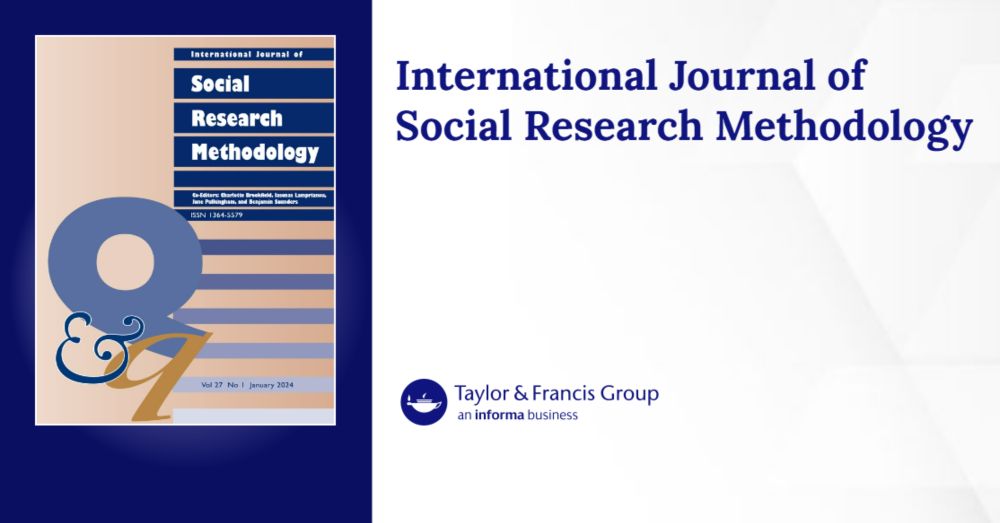Congratulations! 🥳
29.09.2025 14:45 — 👍 1 🔁 0 💬 0 📌 0

Screenshot of the call for applications for MZES Visiting Fellowships, 22 September 2025. For the full text, please follow the link.
📣 Attention, postdoctoral researchers!
❗ Apply now for our MZES Visiting Fellowships 😊
💡 Spend 2-4 weeks at the MZES to share ideas
💰 Funding for accommodation, travel, daily allowance
📆 Deadline: 28 November
Full information:
👉 www.mzes.uni-mannheim.de/en/news/deta...
22.09.2025 09:29 — 👍 23 🔁 25 💬 0 📌 4

"I'm just a goat, standing in front of a contestant, asking them to choose me"
Monty Hall reminder: the only good reason to want the car is to sell it for more goats.
15.09.2025 07:34 — 👍 22 🔁 7 💬 1 📌 0

🚨 New working paper alert 🚨
Missing summer — and the Tour de France? Don’t worry, we got you covered. 🚴♂️🚴♂️🚴♂️
In this paper, we show that being on the route of Tour de France reduces far-right voting. osf.io/preprints/so...
16.09.2025 10:25 — 👍 265 🔁 88 💬 15 📌 33

We present our new preprint titled "Large Language Model Hacking: Quantifying the Hidden Risks of Using LLMs for Text Annotation".
We quantify LLM hacking risk through systematic replication of 37 diverse computational social science annotation tasks.
For these tasks, we use a combined set of 2,361 realistic hypotheses that researchers might test using these annotations.
Then, we collect 13 million LLM annotations across plausible LLM configurations.
These annotations feed into 1.4 million regressions testing the hypotheses.
For a hypothesis with no true effect (ground truth $p > 0.05$), different LLM configurations yield conflicting conclusions.
Checkmarks indicate correct statistical conclusions matching ground truth; crosses indicate LLM hacking -- incorrect conclusions due to annotation errors.
Across all experiments, LLM hacking occurs in 31-50\% of cases even with highly capable models.
Since minor configuration changes can flip scientific conclusions, from correct to incorrect, LLM hacking can be exploited to present anything as statistically significant.
🚨 New paper alert 🚨 Using LLMs as data annotators, you can produce any scientific result you want. We call this **LLM Hacking**.
Paper: arxiv.org/pdf/2509.08825
12.09.2025 10:33 — 👍 259 🔁 94 💬 5 📌 19

we're hiring assistant professor in computational social science, applications close 26/10/2025
We're hiring an Assistant Professor in Computational Social Science ❗
📚 jobs.lse.ac.uk/Vacancies/W/...
Apply before 26 October and join an internationally outstanding group of social science methodologists 🌎
11.09.2025 15:09 — 👍 47 🔁 57 💬 0 📌 2

The (mis)use of Google Trends data in the social sciences - A systematic review, critique, and recommendations
Researchers increasingly use aggregated search data from Google Trends to study a wide range of phenomena. Although this new data source possesses som…
ICYMI: If you’re working or are planning on working with Google Trends Data for research, make sure to read this article by @floriankeusch.bsky.social & co-authors. They explore common pitfalls, incl. construct validity and reliability, and show how to improve data quality to enhance robustness.
11.09.2025 07:07 — 👍 4 🔁 3 💬 0 📌 0
Thanks for the recognition! 🥳 My USP: delivering reviews before the reminders.
11.09.2025 13:07 — 👍 3 🔁 0 💬 0 📌 0

Reviewing, and doing it well, is one of the best services one can do to our profession. Massive thanks to the winners of the #ecsr2025 Best Reviewer Award: @saidhassan.bsky.social, @katyaoivanova.bsky.social, Nicole Schwitter
04.09.2025 09:19 — 👍 61 🔁 8 💬 1 📌 3
WE ARE HIRING! 2 Lecturers in Quantitative Social Science. Want a friendly interdisciplinary department in one of the world's most vibrant cities? This just might be for you.
Apply by: 10 Oct
www.ucl.ac.uk/work-at-ucl/...
01.09.2025 13:59 — 👍 146 🔁 157 💬 3 📌 9

Call for Papers and/or research designs for a workshop on "Survey Experiments in the Social Sciences" at the University of Amsterdam in October.
@bramlancee.bsky.social and I are organising the 3rd AMCIS Workshop on "Survey Experiments in the Social Sciences", 1-2 October 2025 in Amsterdam.
We are looking for Papers and/or Research Designs. Please email your submission to me and Bram, submission deadline is 27/08/2025.
@aissr.bsky.social
11.08.2025 14:09 — 👍 11 🔁 14 💬 0 📌 1
🔈Job Alert! IAS is looking for a postdoctoral researcher as part of the Swedish Excellence Center in Computational Social Science -SWECSS.
⌛Deadline: September 30th
Apply 👉 liu.se/en/work-at-l...
#academicsky #css
21.08.2025 11:37 — 👍 11 🔁 11 💬 0 📌 0

Karl Marx labubu... no, labour theory of value
18.08.2025 06:42 — 👍 1715 🔁 580 💬 19 📌 22

🤖💡 Are LLMs really developing social behaviors—or just reproducing familiar patterns from training? In our new paper, @pettertornberg.com and I take a closer look at recent claims of emergent conventions in AI and offer a different perspective... 🧵
02.06.2025 06:41 — 👍 92 🔁 26 💬 6 📌 5
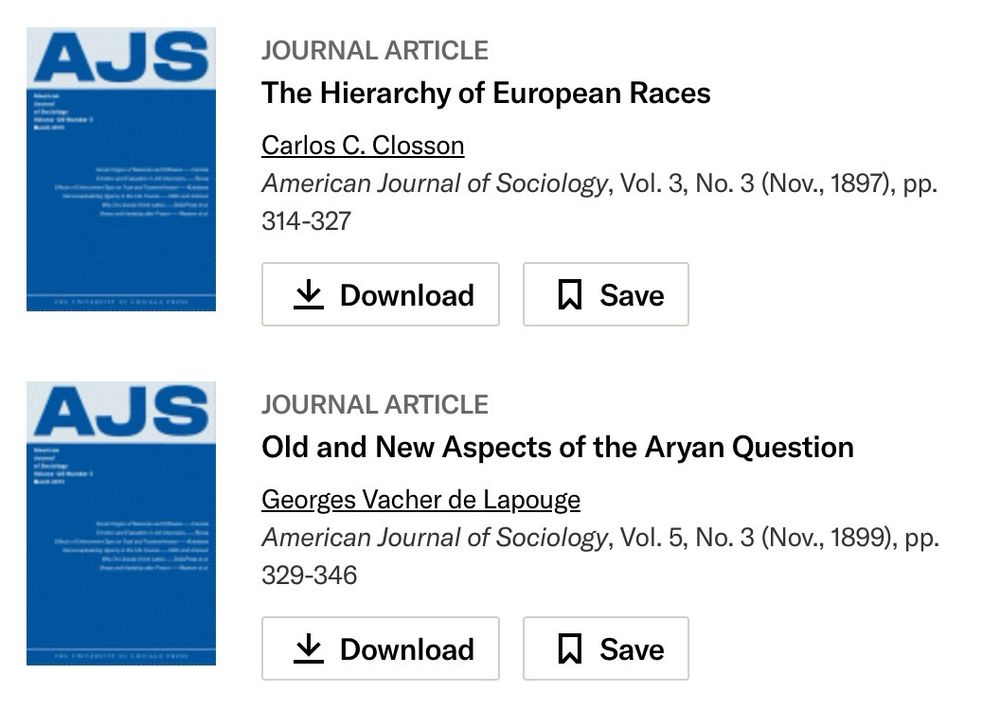
Late-1800s titles in American Journal of Sociology, including “The Hierarchy of European Races” and “Old and New Aspects of the Aryan Question”
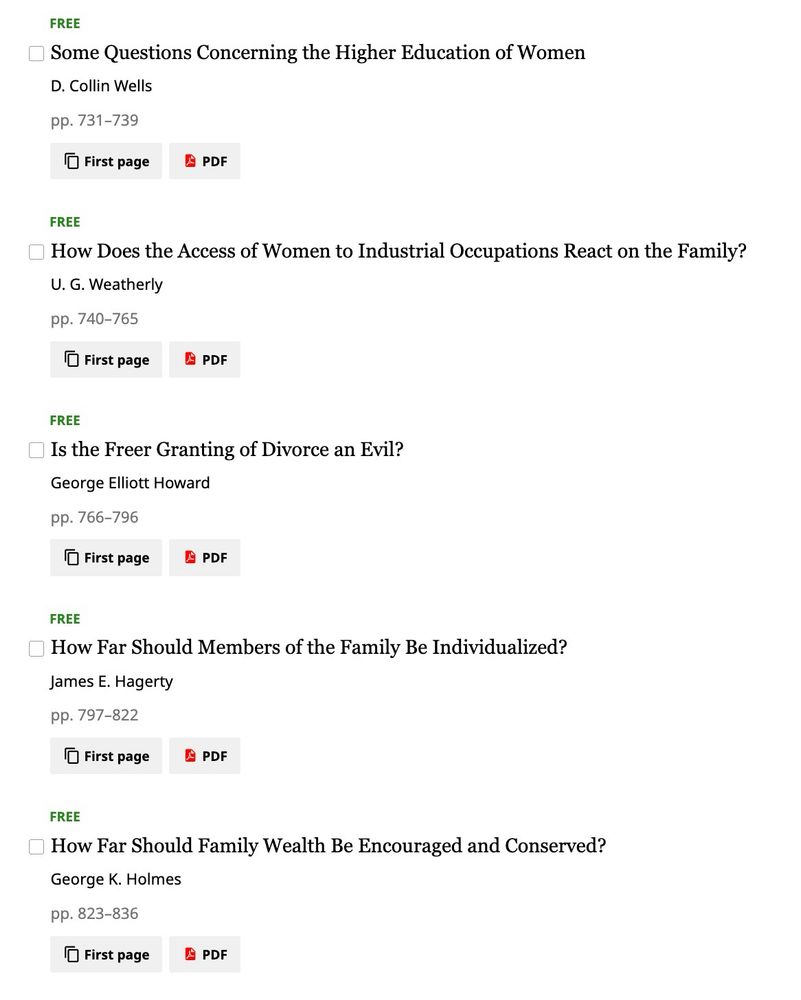
1909 issue of American Journal of Sociology with titles: “Some Questions Concerning the Higher Education of Women,” “How Does the Access of Women to Industrial Occupations React on the Family?,” “Is the Freer Granting of Divorce an Evil?,” “How Far Should Members of the Family Be Individualized?,” and “How Far Should Family Wealth Be Encouraged and Conserved?”
When they tell you academia is a woke bubble just remember where we came from
14.03.2025 12:34 — 👍 73 🔁 21 💬 5 📌 3

A banner advert for the University of Warwick, which says "Beyond ignores curiousity". This is a spelling error.
The University of Warwick has paid a lot of money, I'm guessing, for their internet banner ads on the Guardian and elsewhere.
But they can't spell "curiosity". This isn't a US-UK variant. They just, genuinely, have a massive spelling error in their banner ads.
08.08.2025 08:22 — 👍 1021 🔁 289 💬 114 📌 136
Details
GESIS Leibniz Institut für Sozialwissenschaften
🚀 New postdoc position for Platform Data & Computational Social Science
Join us to drive @gesis.org' efforts around the Digital Services Act (DSA) and conduct research with online platform data
💼 TV-L EG 14 | Location: Cologne
📌 Apply now: www.gesis.org/en/institute...
#DSA #CSS #DataScience
29.07.2025 06:25 — 👍 47 🔁 47 💬 0 📌 2
🎥 All keynote talks from IC²S² ‘25 are now available on our YouTube channel!
#ic2s2 #css
25.07.2025 19:13 — 👍 22 🔁 9 💬 0 📌 0
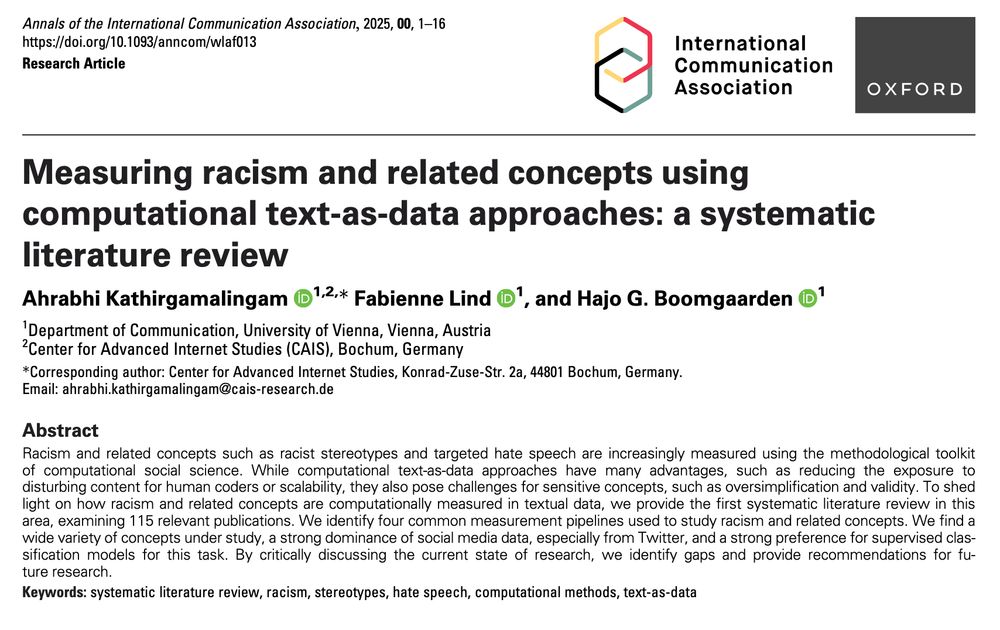
Thinking about using #CSS methods to study #racism, #stereotypes or #hate speech in text? 📐
👉 Check out my first dissertation paper co-authored by @fabiennelind.bsky.social and @hajoboo.bsky.social just published in Annals of the ICA! @icahdq.bsky.social 🥳
🔗 doi.org/10.1093/annc...
21.07.2025 06:43 — 👍 88 🔁 37 💬 2 📌 1
Quite a strong final statement: "Descriptive research is important and it is a pity that the general obsession with causal estimates disincentivizes researchers from attempting to publish careful and detailed description."
09.07.2025 10:19 — 👍 89 🔁 32 💬 4 📌 2
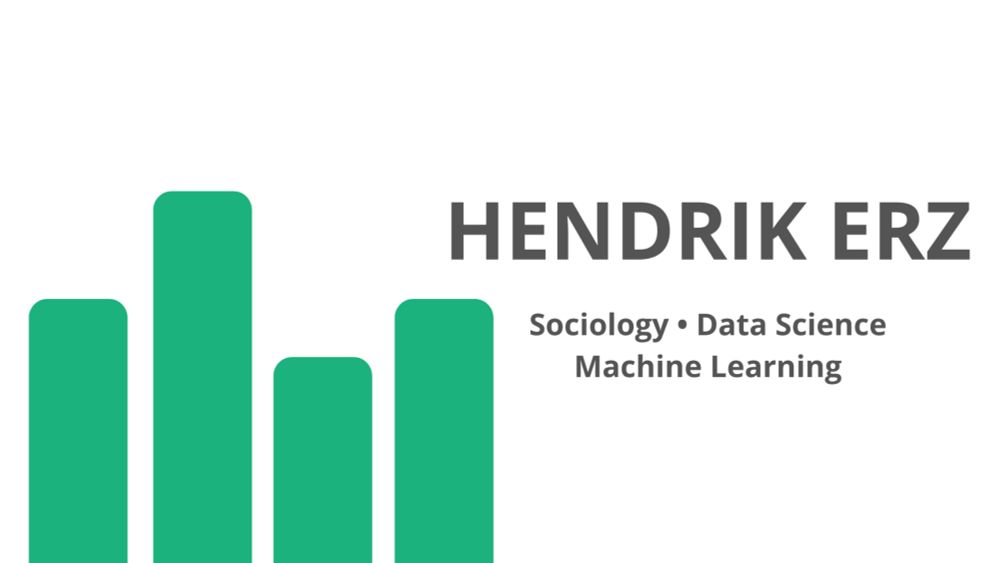
Hendrik Erz
PhD Student at the IAS, Linköping University (Sweden)
+++ ANNOUNCEMENT +++
I'm currently on the job market, looking for Postdoc opportunities (end of 2025/early 2026).
If you are — or know someone who is — in need of a political sociologist/computational social scientist, please get in touch or share my CV!
More info: www.hendrik-erz.de
24.06.2025 07:40 — 👍 11 🔁 13 💬 0 📌 0
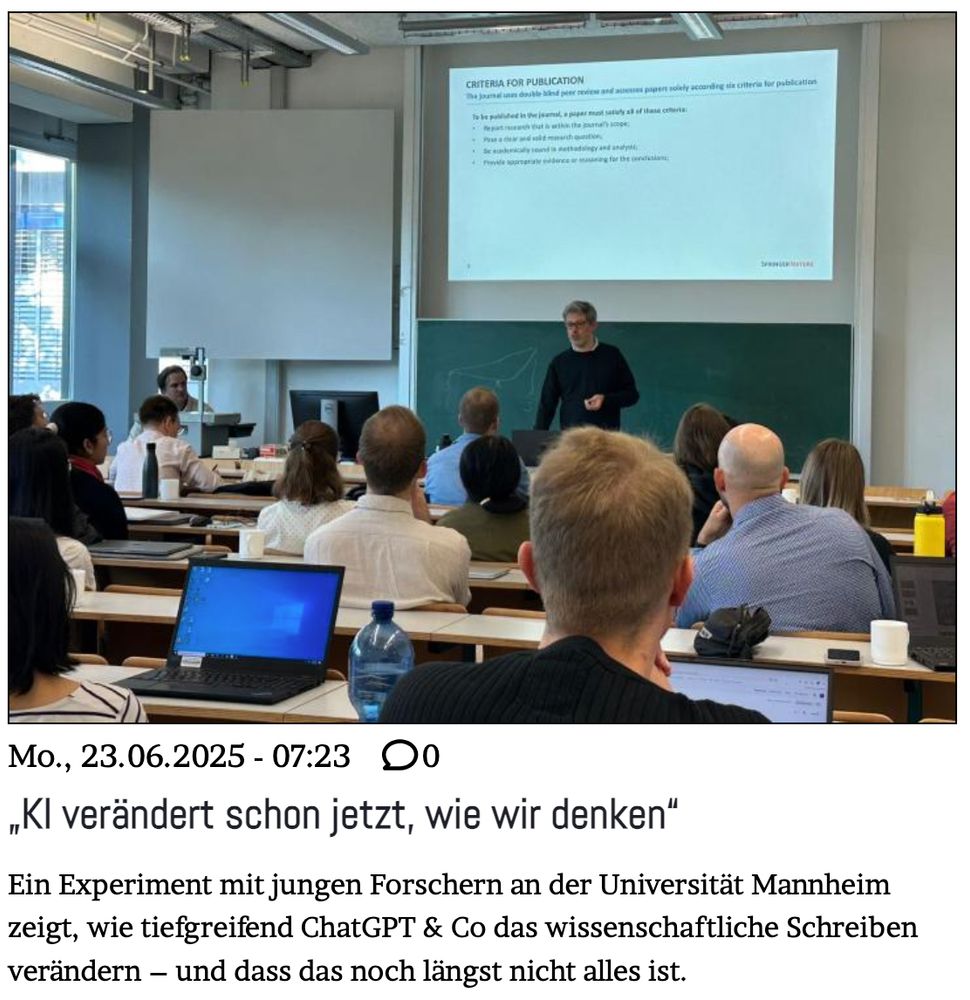
„KI verändert schon jetzt, wie wir denken"
Ein Experiment mit jungen Forschern an der Universität Mannheim zeigt, wie tiefgreifend ChatGPT & Co das wissenschaftliche Schreiben verändern – und dass das noch längst nicht alles ist.
Im Wiarda-Blog: www.jmwiarda.de/blog/2025/06...
23.06.2025 10:29 — 👍 43 🔁 23 💬 2 📌 3
🧠🚀 What happens when early-career social scientists use ChatGPT for academic writing? Clearer and more coherent text - but no boost to depth, originality, rigour, or literature use, according to our field experiment.
📄👇
23.06.2025 11:12 — 👍 14 🔁 5 💬 0 📌 0
Call for papers: Generative AI and Social Science Research
journals.sagepub.com/topic/collec...
19.06.2025 10:49 — 👍 3 🔁 3 💬 1 📌 1
Thanks for the shoutout!
Our review of 69 experimental studies on disability discrimination in hiring shows:
✳️ Big gaps in callback rates
✳️ Some conditions get all the attention
✳️ We need more theory + intersectionality
13.06.2025 14:09 — 👍 10 🔁 5 💬 0 📌 0
Congratulations again 🥳
11.06.2025 09:31 — 👍 1 🔁 0 💬 0 📌 0

Norrköping campus at sunset
We are hiring postdocs in Computational Social Science
📍SweCSS, Norrköping, Sweden
⏰Deadline June 3
🔗https://liu.se/en/work-at-liu/vacancies/26854
Please apply // help us spread the word
13.05.2025 12:47 — 👍 106 🔁 76 💬 2 📌 1
Professor at Humboldt University
www.anselmhager.com
Research fellow in sociology @uni-wuppertal.bsky.social
Professor of Sociology, Sciences Po, CRIS
PhD candidate in computational communication science @newsflows.eu, VU Amsterdam, Assistant Editor @CCR. Interested in politics of big tech & journalism, social media cultures, recommender systems, flows and influence online.
Family sociologist at Tilburg University interested in how people 'do' #family | family plurality | societal pessimism & #fertility decisions / #childlessness | #Sociology | a migrant in 🇳🇱
Website: katyaivanova.eu
Assistant Professor the Polaris Lab @ Princeton (https://www.polarislab.org/); Researching: RL, Strategic Decision-Making+Exploration; AI+Law
PhD at GESIS & Uni Heidelberg
Behavioral/personality science in the digital space @prosocialdesign.org & @one-sec.app.
Occasionally, research methods.
Assistant Professor @ University of Calabria 🇮🇹
👨🏻💻 Ph.D. in Information and Communication Technologies
Prev. Visiting @ IT University of Copenhagen 🇩🇰
🤖 Multimodal Representation Learning & Networks
https://luciolacava.me/
Academic QMUL. Social data science, Computational social science, NLP. he/him
Decentralised networks of humans and machines
https://www.andreabaronchelli.com/
Associate Prof @uwcomm. I study tech & inequality in 🇦🇲 & 🇦🇿. Posts research & pop culture & parenting. She/her.
Incoming Asst Prof @UMD Info College, currently postdoc @UChicago. NLP, computational social science, political communication, linguistics. Past: Info PhD @UMich, CS + Lx @Stanford. Interests: cats, Yiddish, talking to my cats in Yiddish.
Applied scientist trying to make the internet a little better. PhD. Trust & safety, platform manipulation, networks, fingerstyle guitar. I use my hair to express myself. He/they
Social computing PhD candidate @ UW. I study user engagement with interventions, prosocial behavior, and antisocial content across online platforms.
https://linktr.ee/kristenengel
Assistant professor at Northwestern Kellogg | human AI collaboration | computational social science | affective computing
Computational Social Science researcher interested in Human Coordination and Climate Action. Professor of Data Science at the IT University of Copenhagen. Network Science | NLP | AI agents | Urban Informatics
http://www.lajello.com
Usually professoring, parenting, running, etc. Social science and design of digital public goods in online communities. Northwestern University, Chicagoland. https://communitydata.science
Assistant professor at https://si.umich.edu/ working in computational social science, machine learning, and NLP | https://dallascard.github.io
Postdoc at ETH. Formerly, PhD student at the University of Cambridge :)
Learning more about the world using stats and texts.
Computational social scientist studying decentralized social networks.
PhD Candidate at Northwestern with @communitydata.science (ABD!)
I post about: land use, Chicago, and #Rstats
🤓🏳️🌈🦞













